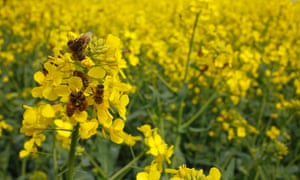Landscape-wide research by former UK government agency on oilseed rape fields in England and Wales shows link between neonicotinoids and honeybee colony losses

A new study provides the first evidence of a link between neonicotinoid pesticides and escalating honeybee colony losses on a landscape level.
The study found the increased use of a pesticide, which is linked to causing serious harm in bees worldwide, as a seed treatment on oilseed rape in England and Wales over an 11 year period correlated with higher bee mortality during that time.
The research, published in Nature scientific reports on Thursday, combined large-scale pesticide usage and yield observations from oilseed rape with data on honeybee loses between 2000 and 2010.
The total area of land planted with oil seed rape in England and Wales more than doubled from 293, 378 hectares (724,952 acres) to 602,270 hectares over that time and the number of seeds treated with the imidacloprid pesticide increased from less than 1% of the area planted in 2000 to more than 75% of the area planted with oilseed rape by 2010.
Comparing the pesticide usage data with honeybee colony losses, scientists led by Giles Budge at the Food and Environment Research Agency (Fera) in York – a former government agency that was outsourced to the private sector earlier this year – and US entomology professor Keith Delaplane at the University of Georgia, found a link between imidacloprid usage and honeybee colony losses. Losses varied between regions and low spring temperatures were also linked to higher bee losses in Wales.
The study, also found that famers who used seed pesticide treatments reduced the number of applications of other insecticides, but that the long-term benefits of treating oil seed rape seeds with imidacloprid on crop yields were negligible.
The honeybee is the most important commercial pollinator, globally responsible for pollinating at least 90% of commercial crops. They are the most frequent flower visitor to oilseed rape. The report’s authors said: “As long as acute toxins remain the basis of agricultural pest control practices, society will be forced to weigh the benefits of pesticides against their collateral damage. Nowhere is this tension more evident than in the system with the world’s most widely used insecticide, the world’s most widely used managed pollinator and Europe’s most widely grown mass flowering crop.”
Advertisement
The authors call for more large-scale field-based research to determine the impacts on pollinators of the use of a newer generation of neonicotinoids.
The UK government has always maintained that neonicotinoid pesticides do not threaten bees. It has laid the blame for high honeybee losses on the parasitic varroa mite which spreads viruses, and wet summers that prevent bees from foraging.
A European-wide two year ban on a number of pesticides linked to bee deaths came into force in December 2013. Last month, the UK government temporarily overturned the ban on two pesticides on about 5% of England’s oilseed rape crop. The Department for Environment, Food and Rural Affairs (Defra) said the emergency authorisation did not apply to imidacloprid. It added that the use of this particular pesticide had fallen dramatically in the UK, down from 43,900 kilos in 2005 to just 7,250 kilos in 2013.
A Defra spokesperson said: “This paper provides evidence that neonicotinoid seed treatments can reduce the need for more pesticide use on crops. Large-scale field studies are needed to fully understand their effects on the environment. The government makes decisions on pesticides based on the best available scientific evidence.”
It added: “The EU commission has now begun a review of the science relating to neonicotinoids and bees, and the UK will contribute fully to this review.”
Paul de Zylva, senior nature campaigner at Friends of the Earth said the Fera study added to the growing evidence showing the harm neonicotinoid pesticides do to pollinators. “The pesticide industry can’t continue to maintain that there is no effect of their products on honey bees and wild bumblebees and solitary bees,” he said.
But Julian Little, a spokesman for Bayer Cropscience, manufacturer of imidacloprid, said the study’s findings were “at odds with several other field studies which showed no impact on honeybees under properly controlled testing”.

